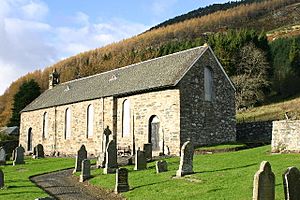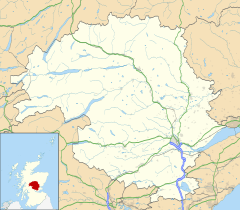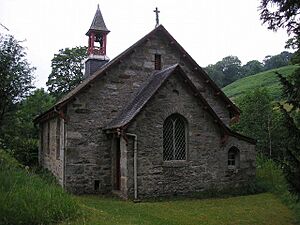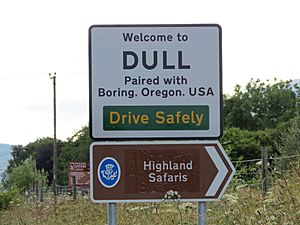Dull, Perth and Kinross facts for kids
Quick facts for kids Dull
|
|
|---|---|
 The Dull church |
|
| OS grid reference | NN806491 |
| Council area | |
| Lieutenancy area | |
| Country | Scotland |
| Sovereign state | United Kingdom |
| Post town | ABERFELDY |
| Postcode district | PH15 |
| Dialling code | 01887 |
| Police | Tayside |
| Fire | Tayside |
| Ambulance | Scottish |
| EU Parliament | Scotland |
| UK Parliament |
|
| Scottish Parliament |
|
Dull (pronounced 'Dul' in Scottish Gaelic) is a small village in Perth and Kinross, Scotland. It's famous for being "paired" with a town called Boring in Oregon, USA! They even have another friend, Bland in Australia. Together, they form a special group called the League of Extraordinary Communities.
Contents
What is Dull?
Dull is a unique village known for its unusual name and its fun connections with other places. It's a quiet spot in the Scottish countryside.
Where is Dull Located?
Dull is found in the beautiful Scottish Highlands. It's a quiet place with just one street of houses. This street sits on the north side of the valley where the River Tay flows.
What Does the Name "Dull" Mean?
The name Dull might come from an old language called Pictish. In Pictish, the word *dol meant "water-meadow" or "haugh". This is similar to the Scottish Gaelic word dail, which means a meadow. The modern Gaelic name for the village is "Dul".
A Look Back: The History of Dull
Dull has a long and interesting past, stretching back many centuries.
Ancient Beginnings: The Monastery
The church in Dull stands on a very old site. It was once home to an early Christian monastery. This monastery was founded by a saint named Adomnán. He was an important abbot (leader) of Iona and passed away in the year 704.
Archaeologists have found several old Christian stone slabs near the church. These date back to the 7th or 8th century. One special slab shows carved warriors and horsemen in the style of the Picts. It was found in the 1800s and is now on display in the Museum of Scotland. It might have been part of a wall carving or a special box-shrine. There's also a large, rough stone font near the church door. This is likely another relic from the early monastery.
The area around Dull was once known as the Appin of Dull. The word "Appin" comes from an old Irish word meaning "abbacy". This refers to the land that belonged to the monastery. Four undecorated stone crosses once marked the boundaries of the monastery's sacred area. Three of these crosses still exist today. One is in Dull, and two others are in the old church at nearby Weem.
Later Years and Modern Times
From the Middle Ages onwards, the church in Dull served as a parish church. It was part of the Diocese of Dunkeld. We don't know exactly when the early Christian monastery stopped being active.
During the 20th century, the village saw a decline. Its church and school both stopped being used. However, in the 21st century, Dull has seen new life. Several new houses have been built, and older buildings have been restored.
How Many People Live in Dull?
In 1951, the wider parish of Dull had a population of 2,055 people. However, the village itself is much smaller. As of 2012, the population of Dull village was about 84 people.
Dull's Special "Twin" Towns
Dull is famous for its unique "twinning" relationships with other places that also have interesting names.
The Story of Dull and Boring
Dull is twinned with Boring, Oregon, in the United States. This idea came from Elizabeth Leighton of Aberfeldy, Scotland. She was on a cycling holiday in Oregon and passed through Boring. She thought it would be fun to pair the two towns because of their names!
In June 2012, Boring, Oregon, agreed to the idea. They hoped this "pairing" would help promote tourism in both places. The community in Boring even made special T-shirts and mugs that said "Boring & Dull: a pair for the ages." They even raffled off a trip to Dull, Scotland! Dull and Boring celebrate their connection every year. Boring's celebration is on August 9th, and Dull's is in October.
Joining the "Trinity of Tedium"
In 2013, another place joined the fun: Bland Shire in New South Wales, Australia. Bland Shire is a farming area and used to be a gold prospecting site.
This wasn't a traditional "twin town" relationship. Instead, the three places created a "League of Extraordinary Communities." This group became known as the "Trinity of Tedium." It's a playful way to connect these towns with unusual names.
 | William M. Jackson |
 | Juan E. Gilbert |
 | Neil deGrasse Tyson |




